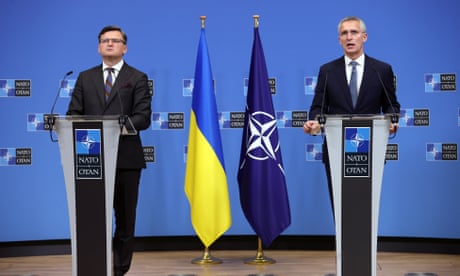Boris Johnson sends message to nations amid rising tensions on borders of eastern Europe
Boris Johnson has warned that the west must soon choose between reliance on Russian gas and standing up for Ukraine amid continuing tensions on the borders of eastern Europe.
In a message to European countries that are heavily dependent on Russian gas, the prime minister suggested he believes Vladimir Putin could be serious about restricting supplies from pipelines that run through eastern Europe, if the west signals its intention to defend Ukraine.
He also accused Belarus’s authoritarian president, Alexander Lukashenko, an ally of Russia, of an “abhorrent” attempt to engineer a migrant crisis on the border with Poland in an effort to undermine European unity.
EU foreign ministers are now expected to expand sanctions against Belarus to include airlines, travel agents and individuals alleged to be helping to entice migrants to Europe in what is being described as a “hybrid attack” on the bloc.
Speaking at the Lord Mayor’s Banquet, Johnson said: “When our Polish friends asked for our help to deal with a contrived crisis on their border with Belarus, we were quick to respond. And we hope that our friends may recognise that a choice is shortly coming between mainlining ever more Russian hydrocarbons in giant new pipelines and sticking up for Ukraine and championing the cause of peace and stability, let me put it that way.”

Earlier in the day, Downing Street also voiced concern about the buildup of Russian forces along the border with Ukraine. Russia dismissed claims that it is preparing to invade, after the Ukrainian defence ministry reported that about 90,000 Russian troops were massing in the area.
However, the prime minister’s official spokesperson said: “We are seeing a concerning situation at the border. We remain in unwavering support for Ukraine’s territorial integrity and will continue to support them in face of Russian hostility.”
Over the weekend, Gen Sir Nick Carter, the outgoing head of the army, said the west would have to be prepared for an escalation of tensions with Russia. Asked whether it could turn into a shooting war, Carter said: “I don’t know. I think we have to be on our guard and make sure deterrence prevails and critically we have to make sure there is unity in the Nato alliance and we don’t allow any gaps to occur in our collective position.”
Johnson also used his speech at the Lord Mayor’s banquet to speak about the Cop26 summit, saying it was “frustrating” to have seen the commitment to phasing out coal weakened to “phasing down” the fossil fuel. But he added: “I have been watching politics a long time now and I know when a tipping point is reached.
“The language does matter, but whether you are talking about phasing down or phasing out, the day is now not far off when it will be as politically unacceptable, anywhere in the world, to open a new coal-fired power station as it now is to get on an aeroplane and light a cigar.”
He went on to make a plea for international cooperation, saying the Cop26 summit was perhaps helped by “a collective sense of embarrassment at the way internationalism failed us during Covid: the squabbles over PPE, the crazy decisions of some countries to try to stop the export of vaccines to others, something we were victims of at the start of this year.”
In the wide-ranging speech, he also made a pledge to make the UK into a “science superpower”, promising to “go big on quantum computing”.
“If AI can mimic the intuitive flair of the human brain, then quantum computing will enable us to process information so fast that we can process an almost infinite number of solutions at once,” he said. “And if we could perfect it, there are so many problems we could solve, including how to turn nitrogen into fertiliser and feed the world without creating so much CO2.
“So I am setting the ambition that the UK will aim to build a general-purpose quantum computer, and secure the single biggest share of a global quantum computing market by 2040.”
